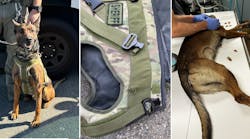Any cop worth their salt knows that during the silly period of days immediately following Thanksgiving up until Christmas the number of theft related offenses in their jurisdiction skyrockets. The traditional causes of theft - opportunity and desire with the latter having arguably been intensified due to the continuing poor economy - increase under the pressure of the season. Declining tax revenue, negatively affecting police personnel deployed, means we need to do a better job allocating our time and commitment during this period.
Business as usual
Driving for dollars as some officers call it or Randomized Routine Patrol as researchers have identified it essentially means patrolling without purpose. Hopping in your cruiser, if not going to a call, immediately after roll-call and trying to drive systematically unsystematic, as trained in the academy so as not to be predictable. Although in concept this tactic sounds logical, the research over the last forty years proves it to be a waste of time and money; think of the Kansas City Preventative Patrol Experiment (1973).
Directed patrol, on the other hand, based on intelligence can help maximize your time and effort. The Shoplifting Guide No. 11 (2002), from the Center of Problem Oriented Policing (linked in below), takes the guesswork out of the arduous prospect of having to gather and interpret your own statistics in order to effectively determine how a patrol supervisor could deploy their limited resources. Instead, the guide, written by Professor Richard V. Clark, Rutgers University, details potential solutions based on previously gathered information, some of which was directly gathered through interviews with the offender and their recovered stolen property and is applicable nearly everywhere.
What is Taken and Where
For the street officer understanding the relationship between what is taken and where the stolen item was sold is important. Knowing this relationship can help identify targets for thievery. The guide establishes the acronym CRAVED, which means those historically stolen items that are concealable, removable, available, valuable, enjoyable and disposable, as fulfilling the attributes of hot products that thieves desire. Other High-Risk Merchandise by Store Type further categorizes highly desired stolen articles as being (in order of importance; roughly top 5):
- Auto Parts - CD players, dash covers, and other accessories.
- Book Stores - CDs, magazines and books.
- Department stores - Shirts, the most popular brands.
- Drug/Pharmacy - Cigarettes, batteries and over the counter medicine.
- General Merchandise - Earrings
From this information patrol personnel can devise that strip malls, cluster shopping areas, and other locations where generally there is more than one isolated store standing will most likely be targeted by thieves.
Who Took it and When
Identifying your offenders and when they are most likely to strike is also important if trying to offset an onslaught of theft during the holiday season. Dr. Clark notes that young males are the typical offender, statistically, and more offenses occur late in the shopping week of Wednesday through Saturday, which is when sales peak due to higher shopper activity. Since juveniles account for many of the shoplifting suspects, incidents increase on non-school days and start in the late morning and run into the evening time period.
Officers can extrapolate this data to mean that those on the later half of the day-watch and nearly all of the afternoon-watch will probably encounter most of the shoplifting incidents that are known and reported.
Partnership Policing
At least in the last twenty years that I've been a criminal justice practitioner I've never known what it has been like to not hear the words, do more with less. Today, however, the policing profession really has had to do much more with smaller numbers available for duty. Arresting someone for theft is time intensive. Ever book someone for shoplifting, process them for the felony, and then have to log twenty or thirty pieces of evidence? After completing the report and dropping off the prisoner to the county jail you have been off the road for at least three hours. It only takes a few of these types of calls to completely overwhelm your shift and prevent you from handling other calls for service. Partnering with local security agents for identified locations of concern can help alleviate the problem of getting hammered with shoplifting arrests. The key is to come up with a strategy before the calls come in. Some solutions could be
- Book offenders at the store, in the security department, and issue a summons instead of a physical arrest.
- Evidence is photographed and recorded through store inventory management instead of being seized for courtroom presentation (work with your prosecutor on this).
- Use the civil demand process instead of criminal charges for employee theft situations.
- Identify and charge offenders at a later time (within legal time limits, again - work with your prosecutor).
- Redeploy more officers to cover a smaller area (allow other areas to go unpatrolled) where there is a high degree of theft occurrences.
Our policing environment today necessitates that officers have to explore being more creative when handling calls. Further restrictions in manpower, financial constraints, more of a service demand and other factors relative to your locale force change. A little cooperation and coordination on our part can help ease the service strain we are under, not to mention make the holidays a little less stressful than usual.


